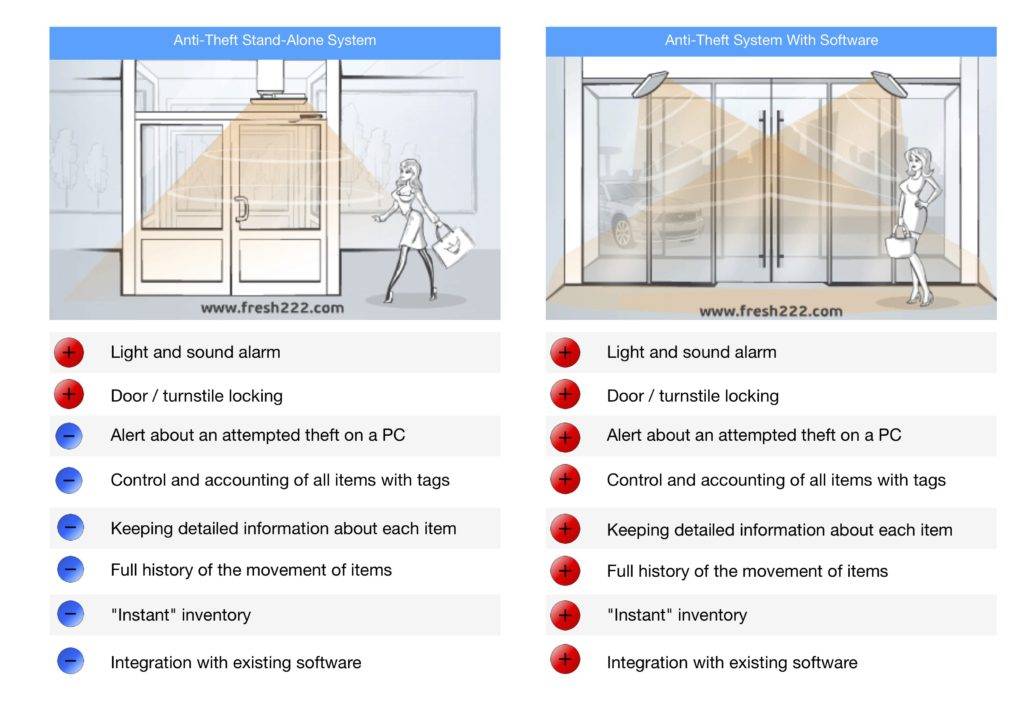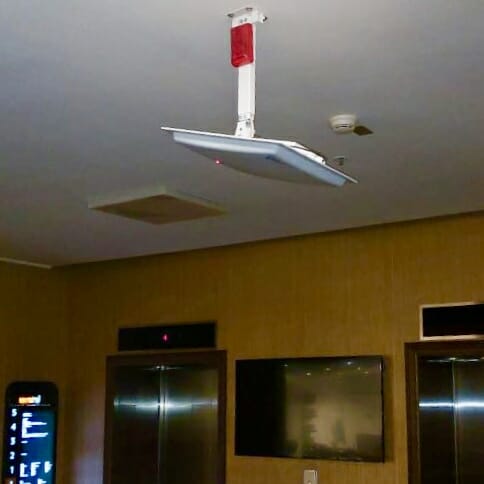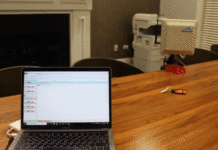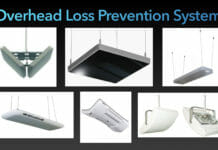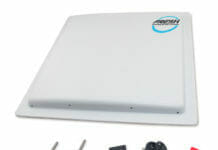Retail theft prevention devices are tools and technologies used by retailers to prevent or deter theft in their stores. These devices are designed to protect merchandise and prevent shoplifting, employee theft, and other forms of retail theft.
What Are Retail Theft Prevention Devices
Here are some common retail theft prevention devices:
– Electronic Article Surveillance (EAS) Systems: EAS systems are used to detect if merchandise is being removed from the store without being paid for. EAS systems typically involve the use of security tags or labels that are attached to merchandise and a detection system at the store exit that can detect if the tag or label has not been deactivated or removed.
– Security Cameras: Security cameras are used to monitor the store and deter theft by providing a visual deterrent and capturing footage of any suspicious activity that can be used for later review or prosecution.
– Security Mirrors: Security mirrors are used to provide a wider view of the store and eliminate blind spots that shoplifters may use to conceal stolen items.
– Lockable Display Cases: Lockable display cases are used to secure high-value items, such as electronics or jewelry, and prevent them from being stolen.
– Cash Register Security Screens: Security screens are used to prevent theft by ensuring that only authorized personnel can access the cash register or point of sale system.
– Employee Theft Prevention Devices: Employee theft prevention devices, such as security cameras in employee-only areas, cash handling policies and procedures, and point of sale transaction monitoring software, can be used to prevent employee theft.
The use of retail theft prevention devices can help retailers to protect their merchandise, reduce losses, and create a safer shopping environment for their customers and employees. Retail theft prevention systems and software developed by FRESH USA have the best solutions for retail operators. For more information, follow the link about theft prevention systems
Retail Theft Prevention Devices And RFID Technology
RFID (Radio Frequency Identification) technology is also commonly used as part of retail theft prevention strategies. RFID technology can be used to track and monitor merchandise throughout the supply chain and in the store, and can also be used as a theft prevention tool.
You can order a reliable and advanced retail theft prevention systems from Fresh USA, click below.
Here are some examples of how RFID technology can be used in retail theft prevention:
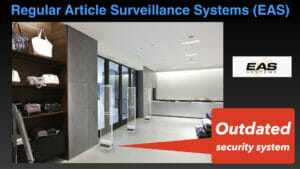
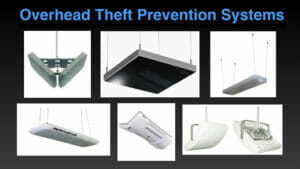
RFID Tags: RFID tags* can be attached to merchandise and used to track the movement of the item throughout the store. If the tag is not deactivated or removed at the point of sale, it can trigger an alarm if the item is taken out of the store without being purchased.
RFID Inventory Management Systems: RFID inventory management systems can be used to track the movement of merchandise throughout the store and provide real-time information on inventory levels. This can help to identify missing or stolen items quickly, reducing losses.
RFID Access Control Systems: RFID access control systems can be used to control access to restricted areas of the store, such as stock rooms or cash handling areas, and ensure that only authorized personnel can enter.
RFID Smart Shelves: RFID smart shelves can be used to monitor inventory levels and detect when items are removed from the shelf without being purchased. This can help to prevent shoplifting and reduce losses.
* Retail theft prevention tags, watch the VIDEO
RFID technology can be an effective tool for retail theft prevention, providing real-time monitoring and tracking of merchandise, as well as automated alerts and alarms to identify potential theft. The use of RFID technology in combination with other retail theft prevention devices can help retailers to create a more secure and efficient store environment
How Retail Theft Prevention Devices With RFID Technology Work
Retail theft prevention devices that incorporate RFID technology can work in several ways to prevent theft in a retail store.
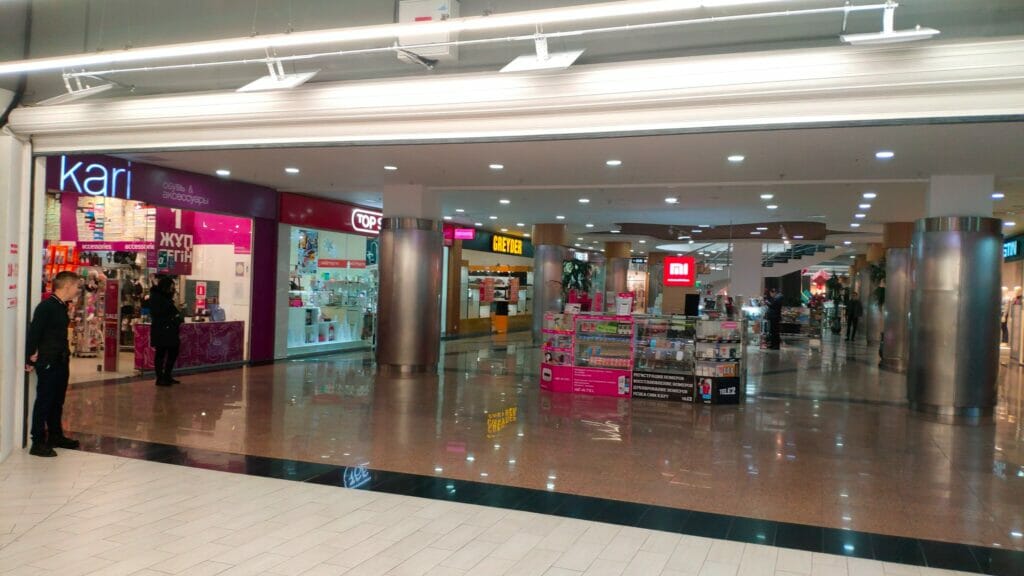
Here are some examples of how these devices can be used together:
- RFID EAS Systems: Electronic Article Surveillance (EAS) systems that use RFID technology can be used to detect when merchandise is being removed from the store without being paid for. RFID tags can be attached to merchandise and a detection system at the store exit can detect if the tag has not been deactivated or removed. This can trigger an alarm, alerting store personnel to potential theft.
- RFID Smart Shelves: RFID smart shelves can be used to monitor inventory levels and detect when items are removed from the shelf without being purchased. When an item is removed from the shelf, the RFID tag attached to the item is read, and if the item is not purchased, an alert can be sent to store personnel.
- RFID Inventory Management Systems: RFID inventory management systems can be used to track the movement of merchandise throughout the store, including from the stock room to the sales floor. This can help to identify missing or stolen items quickly, reducing losses.
- RFID Access Control Systems: RFID access control systems can be used to control access to restricted areas of the store, such as stock rooms or cash handling areas. This can help to prevent employee theft and unauthorized access to sensitive areas of the store.
The use of RFID technology in combination with other retail theft prevention devices can help retailers to improve the security of their stores, reduce losses, and create a safer shopping environment for their customers and employees.
When Choosing Retail Theft Prevention Solutions
When choosing retail theft prevention devices, retailers should consider several factors to ensure that the devices they select are effective in deterring theft and reducing losses. Here are some key factors to consider:
Type of Merchandise: The type of merchandise being sold will affect the type of theft prevention devices that are needed. High-value items, such as jewelry or electronics, may require lockable display cases, while smaller items may require security tags or labels.
Store Layout: The layout of the store will also impact the selection of theft prevention devices. For example, larger stores may require more security cameras and EAS systems to cover all areas effectively.
Budget: The cost of theft prevention devices can vary widely, so retailers should consider their budget when selecting devices. However, it’s important to remember that the cost of losses due to theft can far outweigh the cost of investing in effective theft prevention devices.
Ease of Use: Theft prevention devices should be easy for store personnel to use and maintain. Complicated devices may not be used properly, reducing their effectiveness.
Customer Experience: Theft prevention devices should not negatively impact the customer experience. For example, security mirrors should not be placed in a way that makes customers feel uncomfortable or watched.
Integration with Other Systems: Theft prevention devices should be able to integrate with other systems, such as point of sale systems, to provide a complete solution for theft prevention.
Retailers should consider their specific needs and challenges when selecting theft prevention devices, and choose devices that are effective, easy to use, and provide a positive shopping experience for customers.
Use of Long-Range Wireless Technologies In The Theft Prevention Systems
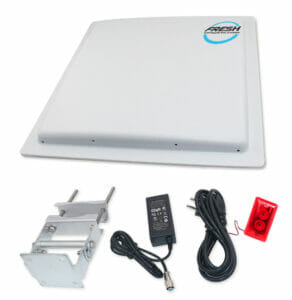
Theft prevention systems manufactured by FRESH USA have been tested for many years of use around the world and work perfectly in all weather conditions. The retail theft prevention devices developed by Fresh USA uses only contactless technologies such as Wi-Fi, 4G / LTE and RFID UHF long range distance with a frequency of 860MHz – 960MHz. You can integrate the theft prevention software with other third-party software or your ERP system using a SQL database or deploy a Web-service.
Any RFID theft prevention system from Fresh USA is Your reliable choice.
The main advantage of a theft prevention with RFID UHF technology is the high read range, which allows for efficient and convenient prevent of thefts without the need for physical contact or line-of-sight communication.
IoT (Internet of Things) technology is increasingly being used in retail theft prevention to provide real-time monitoring and tracking of merchandise and to enhance store security. Here are some examples of how IoT technology can be used in retail theft prevention:
Smart Cameras: IoT-enabled smart cameras can be used to monitor the store and detect suspicious behavior or potential theft. These cameras can be programmed to alert store personnel when certain behaviors are detected, such as a customer lingering in a particular area for an extended period of time.
RFID Inventory Management Systems: IoT-enabled RFID inventory management systems can be used to track the movement of merchandise throughout the store and provide real-time information on inventory levels. This can help to identify missing or stolen items quickly, reducing losses.
Smart Shelves: IoT-enabled smart shelves can be used to monitor inventory levels and detect when items are removed from the shelf without being purchased. This can help to prevent shoplifting and reduce losses.
Electronic Article Surveillance (EAS) Systems: IoT-enabled EAS systems can be used to detect when merchandise is being removed from the store without being paid for. These systems can send alerts to store personnel in real-time, enabling them to take immediate action.
Mobile Devices: IoT-enabled mobile devices can be used by store personnel to monitor the store and receive alerts in real-time. This can help to improve response times to potential theft incidents.
Overall, the use of IoT technology in retail theft prevention can provide retailers with real-time monitoring and tracking of merchandise, as well as automated alerts and alarms to identify potential theft. The use of IoT technology in combination with other theft prevention devices can help retailers to create a more secure and efficient store environment.
